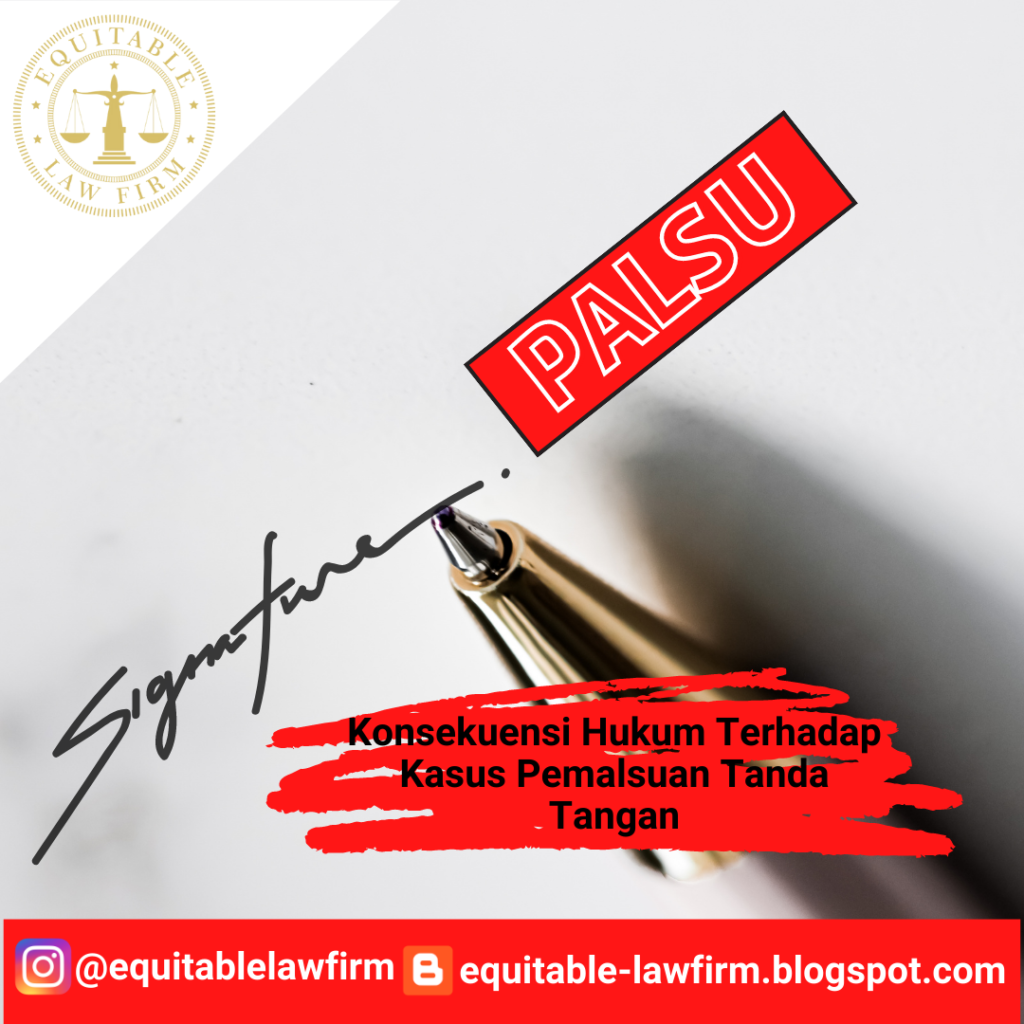Legal Consequences for Signature Forgery Cases
Arranged By : Siti Imroatul Muchsina, S.H.

In Law No. 10. of 2020 concerning Stamp Duty in Article 1 paragraph (3), the definition of a signature is as a name symbol as it is normally used, including initials, impressions or signature stamps, stamps or name stamps, or other signs as a substitute for signatures, or electronic signatures as referred to in the law in the field of information and electronic transactions.[1]
The function of the signature is to show proof of the authenticity of the document or letter and the identity of the author concerned. The signature of a document or letter has the effect that the person signing knows that he has taken a legal action, and already knows the contents of the letter or document. And the existence of a signature illustrates an approval of a letter, letter, or document. But what if a signature that should be attached to a letter or document and signed by the name on the letter is actually signed by someone else, alias forged for personal gain?
In the news, there has been a case of signature forgery by Arief Rosyid. The signature forged by Arif Rosyid is the signature of Jusuf Kalla or JK. The chronology begins with Arief Rosyid, who used to serve as Chair of the Economics Department of the DMI (Indonesian Mosque Council), made and sent an invitation letter from DMI Number 060.III/SUP/PP-DMI/A/III/2022 to Deputy President Ma’ruf Amin to attend Simultaneous Ramadan Festivals throughout Indonesia with activities in the form of MSME exhibitions, Halal Culinary, breaking the fast together, and various activities throughout the full month of Ramadan.
However, what Arief Rosyid did was send an invitation letter to Vice President Ma’ruf Amin by falsifying the DMI letterhead, stamp, and manipulating the signatures of the Chairman of DMI, Jusuf Kalla (JK), and Secretary General of DMI, Imam Addaruqutni.
As a result of his actions, Arif Rosyid had to receive dismissal from the DMI Central Executive. As stated in the DMI Central Management Decree (SK) Number: 066.H/III/SKEP/PP-DMI/DMI/2022 concerning Permanent Dismissal from DMI Management and Membership in the name of Arif Rosyid Hasan. The decree was issued on Saturday, April 2 2022.
In the decree, apart from deciding to permanently dismiss Arief Rosyid from management and members, he was also revoked. In addition, DMI is also not responsible for all oral and written actions on behalf of DMI.
“This decision takes effect from the date it was stipulated and if there is a mistake a review will be carried out as necessary,” wrote the decree signed by JK and Imam Addaruqutni.
Jusuf Kalla learned that Arif Rosyid had forged his signature after being contacted by the Palace Protocol Staff. JK has yet to take legal steps to bring the issue of forging his signature to the realm of law. He is still thinking about taking steps both personally and from the institutional side of DMI. [2]
So what if this problem enters the realm of law? What articles can ensnare Arief Rosyid? In this case, the actions committed are included in the crime of document forgery in Article 263 paragraph (1) of the Criminal Code, which reads:
(1) Any person who makes a forged letter or falsifies a letter which can give rise to a right, an agreement or discharge of debt, which is intended as evidence of something with the intention to use or order someone else to use the letter as if the contents were true and not forged, is threatened if such use can cause harm, due to forgery of documents, with a maximum imprisonment of six years. [3]
However, later only the judge can decide what the penalty for the signature forgery case will be. Because judges need to look at the results of investigations and investigations as material for deciding a case.
#law #criminallaw #fakesignature #advocate
[1] Undang-Undang No 10. Tahun 2020 tentang Bea Materai pada Pasal 1 ayat (3).
[2] Mutia Fauzia. https://nasional.kompas.com/read/2022/04/04/08020841/kronologi-pemalsuan-tanda-tangan-jk-oleh-arief-rosyid-yang-berujung?page=all
[3] Kitab Undang-undang Hukum Pidana Pasal 263 ayat (1).
